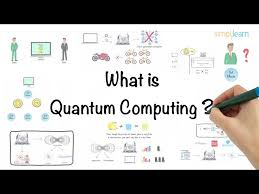
Quantum Computing: Shaping the Future of Technology
In the domain of technological innovation, quantum computing stands as one of the most groundbreaking advancements. This cutting-edge field promises to redefine the way we process information, solve complex problems, and approach challenges in science and industry. With its foundation in principles like superposition and quantum entanglement, quantum computing is not just the next step in computing—it’s jump into the future.
Understanding Quantum Computing

Traditional computers process data in binary, using bits that are either 0 or 1. In contrast, quantum computers use qubits, which can exist in multiple states at once thanks to superposition. This ability enables quantum computers to process an huge amount of information in parallel, hugely surpassing the capabilities of classical systems.
Another core principle of quantum computing is quantum entanglement, a phenomenon where qubits become interdependent such that the state of one qubit instantly influences another, regardless of distance. This property allows quantum computers to perform complex calculations with remarkable efficiency and speed.
Quantum Algorithms: The Key to Unlocking Potential

The power of quantum computing lies in its ability to execute specialized quantum algorithms that solve problems impossible or impractical for classical computers. One famous example is Shor's algorithm, which can factorize large numbers exponentially faster than the best classical algorithms. This has profound implications for fields like cryptography, where breaking encryption would be feasible with quantum computers.
Another transformative algorithm is Grover’s algorithm, which accelerates search processes in unsorted databases. This could revolutionize data retrieval, artificial intelligence, and machine learning applications. As research advances, new quantum algorithms are being developed to tackle a wide range of challenges, from drug discovery to climate modeling.
Future Prospects of Quantum Computing

The future of quantum computing is be filled up with potential. As this technology matures, it is poised to make significant contributions across various domains:
-
Healthcare and Drug Discovery
Quantum computers could reproduce molecular interactions with unparalleled precision, accelerating the development of new drugs and personalized medicine. This capability could revolutionize treatments for diseases like cancer and Alzheimer’s. -
Cryptography and Cybersecurity
While quantum computing poses a threat to current encryption methods, it also offers solutions. Post-quantum cryptography and quantum key distribution are emerging fields that leverage quantum principles to ensure secure communication in a quantum-enabled world. -
Optimization Problems
Industries like logistics, finance, and energy could benefit from quantum computers’ ability to solve optimization problems efficiently. This could lead to better supply chain management, investment strategies, and energy distribution systems. -
Scientific Research and Climate Modeling
Quantum computing could enhance our understanding of complex systems, from subatomic particles to global climate patterns. This knowledge could inform breakthroughs in physics, environmental science, and sustainable technologies.
Quantum Breakthroughs: Challenges and Progress
Despite its promise, quantum computing faces significant challenges. Building stable and scalable quantum systems requires addressing issues like qubit consistency,error correction, and hardware complexity. Advances in materials science, quantum error correction codes, and quantum chip design are critical to overcoming these obstacles.
Recent quantum breakthroughs have reveal steady progress. Companies and research institutions are achieving milestones, such as demonstrating quantum supremacy—where a quantum computer outperforms a classical counterpart in specific tasks. These achievements indicate that quantum computing is transitioning from theory to practical applications.
The Quantum Era Awaits
As we stand on the edge of the quantum era, the possibilities are both exciting and profound. Quantum computing is not just a future technology; it is rapidly becoming a present reality. Its impact will extend beyond computation, influencing society, economy, and our understanding of the universe.
Quantum computing represents a model with the potential to revolutionize industries, solve humanity's most complex problems, and redefine what’s technologically possible. With its reliance on superposition, quantum entanglement, and quantum algorithms, this transformative field is unlocking new frontiers. While challenges remain, the continued following of quantum breakthroughs ensures that the future of quantum computing is bright—and it’s just getting started.
Follow Us
Trending News
Newsletter
Aliqu justo et labore at eirmod justo sea erat diam dolor diam vero kasd



